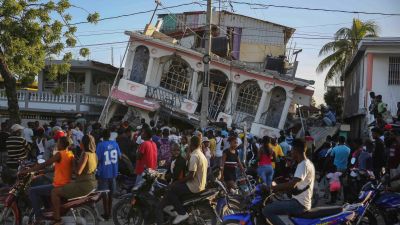Haiti earthquake: Death toll soars to 724 with hundreds injured after 7.2 magnitude quake

The death toll in Haiti has soared to 724 after a 7.2 magnitude earthquake hit the country.
At least 2,800 others have also been injured as rescue workers pull people to safety from the rubble.
In a statement on Sunday, the country's civil defence director said the death toll had more than doubled to 724.
Prime minister Ariel Henry declared a one-month state of emergency for the country and said some towns were almost completely razed after the quake on Saturday.
He said he would not ask for international help until the extent of the damages was known.
Mr Henry said: “The most important thing is to recover as many survivors as possible under the rubble.
“We have learned that the local hospitals, in particular that of Les Cayes, are overwhelmed with wounded, fractured people.”
The epicentre of the quake was about 78 miles west of the capital of Port-au-Prince, the US Geological Survey said.
The prime minister said the International Red Cross and hospitals in unaffected areas were helping to care for the injured, and appealed to Haitians for unity.
Mr Henry also said he wanted “structured solidarity” to avoid the confusion after the 2010 earthquake, when aid was slow to reach residents and as many as 300,000 were killed.
Among those killed in Saturday's quake was Gabriel Fortune, a longtime lawmaker and former mayor of Les Cayes. He died along with several others when his hotel, Le Manguier, collapsed, the Haitian newspaper Le Nouvelliste reported.
Philippe Boutin, 37, who lives in Puerto Rico but visits his family every year in Les Cayes, said his mother was saying morning prayers when the shaking began, but was able to leave the house.
The earthquake happened during the festivities to celebrate the town’s patron saint. Mr Boutin said the hotel was probably full and the small town had more people than usual.
“We still don’t know how many people are under the rubble,” he said.
Naomi Verneus, a 34-year-old resident of Port-au-Prince, said she was woken up by the earthquake which shook her bed.
She said: “I woke up and didn’t have time to put my shoes on. We lived the 2010 earthquake and all I could do was run. I later remembered my two kids and my mother were still inside. My neighbour went in and told them to get out. We ran to the street.”
The disaster comes as the country of 11 million people struggles with the pandemic and a lack of resources to deal with it.
Just last month, Haiti received its first batch of US-donated Covid-19 vaccines through the United Nations programme for low-income countries.
It also comes more than a month after president Jovenel Moise was killed, sending the country into political chaos.
Jean-Wickens Merone, spokesman for humanitarian aid groups World Vision Haiti, said: "We’re concerned that this earthquake is just one more crisis on top of what the country is already facing – including the worsening political stalemate after the president’s assassination, Covid and food insecurity.
Paul Caruso, a geophysicist with the USGS, said aftershocks are likely to continue for weeks or months. The largest one so far had a magnitude of 5.2.
By late Saturday, the island had experienced six aftershocks stronger than 5.0 and nine above 4.0.
Claude Prepetit, a Haitian civil engineer and geologist, warned that some buildings “badly damaged during the earthquake, can collapse during aftershocks.”
Haiti, a country vulnerable to earthquakes and hurricanes, was struck by a magnitude 5.9 earthquake in 2018 that killed more than a dozen people.
A larger 7.1 magnitude earthquake killed an estimated 300,000 people in 2010.
The National Hurricane Centre has forecast that Tropical Storm Grace will reach Haiti late Monday night or early Tuesday morning.